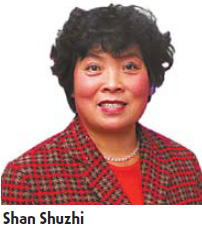
|
|
"We have limited knowledge and are not as strong as men. By running guesthouse, we can not only make money, but also take care of our family," said the 50-year-old Beijinger.
Located at Guandicun village, north of Yanqihu Lake, Huairou district, Shan's No 00001 guesthouse, which has been approved by Beijing tourism bureau, has recently opened two new branches, with a capacity of accommodating up to 150 guests at a time.
With annual guest numbers reaching into the thousands, around 500 of which are foreigners, Shan boasts annual revenue of 100,000 yuan.

But what really makes her glow with pride is the fact that 95 percent of her patrons are regulars.
"It's a really good feeling to entertain tourists from everywhere in China, even the world, and make friends with them," she said.
When Shan first conceptualized the idea of entertaining tourists in her home, it was simply as a way to improve her lifestyle.
"We used to be so poor that I had only one shirt to wear in the summer," she recalled. "Having no other clothes to change, sometimes I washed it at night but had to wear it the next day, even if it was still wet."
In 1993, when the first tourist knocked her door and asked if he could stay, Shan and her husband welcomed him in and let him stay in the big room, while they slept in the smaller one. The man left the next day leaving 20 yuan as a show of gratitude.
She was initially so excited about receiving the payment that she could hardly sleep, she said.
It was the money that finally encouraged her to open a guesthouse in her courtyard house thereafter.
But obviously, she is not alone in thinking that running a guesthouse is good. In her village alone, after seeing her success, 47 of the 58 households in her village have opened guesthouses successively.
But for quite a period of time, the mushroom of guesthouses in the village had not benefited all but, rather, damaged the budding market.
The competition was fierce, with each guesthouse trying to "steal" guests from others by gouging prices. Some visitors complained the discrepant service qualities, Shan said.
| ||||
They co-issued a regulation prohibiting vicious competition and made everything uniform, from the size of the plates to the color of the sheets.
Anyone who violated the regulation would be kicked out of the union.
One direct effect of the new model was a decline in costs.
The union would work together to lower prices, buying the flour and cooking oil together, making the purchasing cost much cheaper.
When the accommodation capacity is full at one of the houses, they would introduce the guests to another member's guesthouse.
People felt the benefits and the market began to stabilize.
"The rest now are jealous of our model and there are 20 neighbors in the waiting list to join us," she said.
Now Shan is working on building their guesthouses to be a brand by learning from major brands like McDonald's.
With nearly 24,000 households in the outskirts of Beijing offering a similar service, simply having hospitality is no longer enough, said Shan.
Although there are still months to go before the coming of the Spring Festival, Shan and other villagers at the moment are busy preparing for the expected flow of tourists by building a parking lot with the funds they raise.
When business was done on the individual level, such a project was never feasible.
With a maximum capacity of parking 200 cars, Shan said their guests will no longer need to queue up and wait along the narrow and zigzag mountain road during the festival.